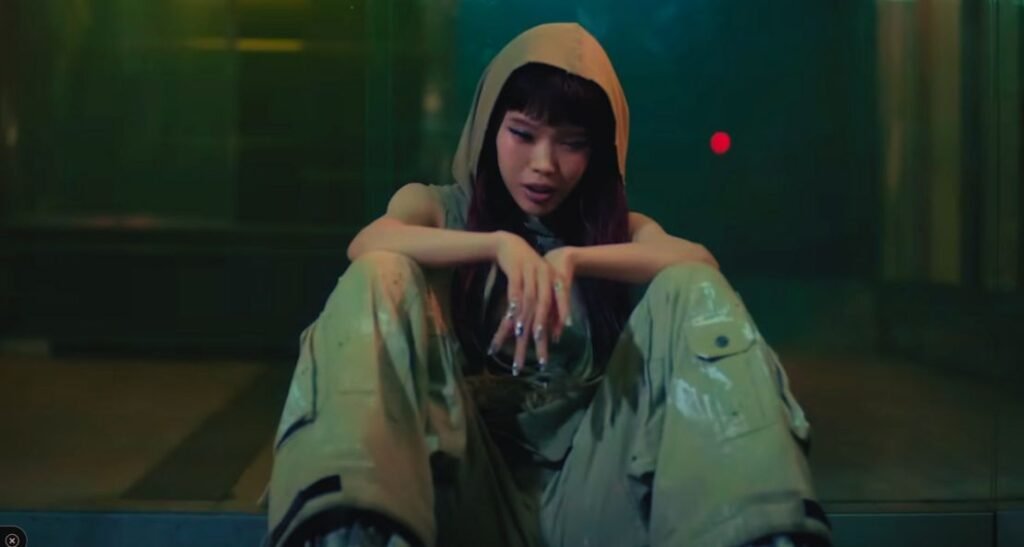AiNA THE END’s “革命道中 – On The Way” is written to move and meant to hold, a vow set to forward motion that opens Dandadan Season 2 with romance pressed against danger.
The single arrived digitally on 2 July 2025, with a CD on 3 September via avex trax, and it doubles as a character compass for this run of episodes on Netflix and Crunchyroll.
AiNA THE END is a Japanese singer and former member of BiSH, the “punk band without instruments,” now a solo artist whose husky, avant-pop voice has fronted anime themes from Gundam: The Witch from Mercury’s “Red:birthmark” to The Apothecary Diaries’ “Ai Kotoba,” which is why Dandadan turned to her for its Season 2 opener.
Credits confirm a tight circle: lyrics and composition by AiNA THE END with longtime collaborator Shin Sakiura, arrangement by Sakiura, mastering by Akihiro Shiba.
The song behaves like something sung from inside the show’s heart rather than placed on top of it, and the July season launch trailer made that link explicit before the premiere.
The sound lives at a confident walk, where the drums feel propulsive without rushing, and a rubbery low end keeps the floor steady while clipped guitars and soft pads leave the vocal unmasked.
AiNA’s upper register bends and scars notes by choice, the micro-cracks reading as intent rather than accident, and that’s what turns a clean pop structure into something more intimate.
The one-take performance on THE FIRST TAKE, published 7 August 2025, shows how the melody arcs, hovers, and falls without studio gloss.
The title translates loosely to a “revolution on the road,” and the lyric treats love as a mission you choose.
Official text and widely shared lyric transcriptions pin the anchors: “君に夢中” marks fixation without surrender; “呪いも病も抱きしめたい” frames protection as burden-sharing; “センチメンタルな恋” names the feeling without softening its edge.
In the context of Season 2’s Avatar of Hatred arc, those lines read like promises made while running, which is why the chant-like lift works as both hook and rally.
Fans have been calling out how the opening leans into Okarun’s feelings while the ending hands the reply to Momo; that split is baked into this text.
The MV extends the show’s occult-meets-teen logic. Directed by G2 YUKI TSUJIMOTO of NOBODER, it cross-cuts human and yokai spaces and leans into AiNA’s physicality as a choreographic thread, an approach that echoes their earlier award-winning “Love Sick” collaboration.
If you came in through the performance door, the acoustic-tinted THE FIRST TAKE version is the cut people share to explain the voice.
The session premiered in early August and raced into the seven-figure view range within weeks as reaction videos multiplied across socials, and the comments captured a pattern: even users who prefer the Season 1 opening call this take “one of the best” for its restraint and control.
Charts tell their own story. Billboard Japan logs No. 1 on the Japan Hot Animation chart in late August and #1 on Global Japan Songs Excl. Japan the following week, with ongoing Hot 100 momentum.
Furthermore, label notes and trade pick-ups confirm the song’s first appearance on the Billboard Global 200 at No. 191, alongside movement on Global Excl. U.S. and a No. 1 on Billboard Global Japan Songs Excl. Japan.
Nine weeks on the Japan Hot 100 so far, a climb to No. 5 on Japan Streaming Songs, and viral-chart traction across more than 50 countries as the anime rollout gathered momentum.
The conversation is not uniform, which is useful. Reddit threads in r/anime and r/Dandadan show a clean split: one camp says the OP “feels like an ending” even while praising the singing, another argues it fits this phase of the story better than Season 1’s wild-eyed opener.
Spanish-language coverage summed up the divide for broader readers, pointing to the first opening’s meme-ready charisma versus Season 2’s more classical framing and a track that trades shock value for emotional clarity. In short, a strong voice, polarised preferences about tone.
What holds the piece together is that AiNA delivers a love song written like a plan.
The verses carry flashlights into dark rooms; the hook keeps repeating the choice to carry someone else’s bad luck; the arrangement lets her voice fray at the edge without losing pitch.
Even if you preferred the unruly spark of Season 1, this cut earns a place because it treats feeling as forward movement and makes that decision sing.
You might also like:
- Beautiful Colors Lyrics Meaning: OneRepublic’s Emotional Anime Song for Kaiju No. 8
- KPop Demon Hunters “Golden” Lyrics Meaning: A K-Pop Anthem with Theatrical Bite
- Top 10 Best Anime of 2025 (So Far) – UK Watch Guide
- Fujii Kaze “Hachikō” Review: Lyrics, Meaning & Video
- Megan Thee Stallion “Otaku Hot Girl” Lyrics: Anime Meets Hip-Hop
- How Depeche Mode’s “Never Let Me Down Again” Became the Anthem of The Last of Us


